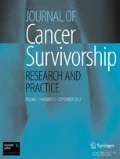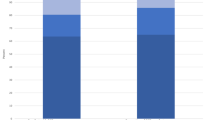Abstract
Purpose
The growing population of cancer survivors indicates an increasing role for primary care practitioners (PCPs). Building on two pilot initiatives, we sought to demonstrate feasibility of a state-wide program of short observational placements for PCPs and identify changes in knowledge and confidence to deliver survivorship care.
Methods
Placements were offered at hospitals with oncology departments across Victoria, Australia. Participants attended a multidisciplinary team meeting and a minimum of two outpatient clinics. Participation targets included at least 70 general practitioners (GPs), 15 practice nurses (PNs) and 15 allied health professionals (AHPs). Mixed methods evaluation included pre- and post-placement surveys.
Results
The program was successfully delivered across eight sites; 148 PCPs enrolled, 58 PCPs withdrew and ultimately 90 PCPs (53 GPs, 15 PNs and 22 AHPs) completed a total of 224 placements. Ninety-two percent (81/89) of participants reported increased knowledge and confidence regarding survivorship care, 87% (78/89) agreed they had opportunities to enhance clinical relationships with specialist teams and 93% (83/89) agreed the program was relevant to their practice.
Conclusions
Building on previous pilots, this third iteration demonstrated the program is sustainable across multiple health services and geographical locations. PCPs reported increased knowledge and confidence regarding survivorship care and that the program provided opportunities to strengthen relationships between primary care and cancer specialists.
Implications for Cancer Survivors
A placement program within tertiary cancer centres offers a feasible, transferable model to build PCP knowledge and confidence to deliver appropriate and quality survivorship care.

Similar content being viewed by others
References
Bray F, Ferlay J, Soerjomataram I, Siegel RL, Torre LA, Jemal A. Global cancer statistics 2018: GLOBOCAN estimates of incidence and mortality worldwide for 36 cancers in 185 countries. CA Cancer J Clin. 2018;68(6):394–424.
Jefford MKE, Pollard A, Baravelli C, Carey M, Franklin J, Aranda S, et al. Survivorship issues following treatment completion—results from focus groups with Australian cancer survivors and health professionals. J Cancer Surviv. 2008;2(1):20–32.
Thursfield V, Farrugia H. Cancer in Victoria: statistics & trends 2016. Melbourne: Cancer Council Victoria; 2017.
Rubin G, Berendsen A, Crawford SM, Dommett R, Earle C, Emery J, et al. The expanding role of primary care in cancer control. Lancet Oncol. 2015;16(12):1231–72.
Evans J, Nolte L, Piper L, Whitfield K, Jefford M. A clinical placement program for primary care professionals at a comprehensive cancer centre. Aust Fam Physician. 2016;45(8):606–10.
Australian Government, Department of Health and Human Service, Optimal Care Pathways. https://www.health.gov.au/internet/main/publishing.nsf/Content/occp. Accessed 7 July 2019.
Johnson CE, Lizama N, Garg N, Ghosh M, Emery J, Saunders C. Australian general practitioners’ preferences for managing the care of people diagnosed with cancer. Asia Pac J Clin Oncol. 2014;10(2):e90–e8.
Walter FM, Usher-Smith JA, Yadlapalli S, Watson E. Caring for people living with, and beyond, cancer: an online survey of GPs in England. Br J Gen Pract. 2015;65(640):e761–8.
Cancer Australia. Role redesign primary care - shared care models of cancer treatment and surveillance post-treatment - final report. Australia 2010.
Clinical Oncology Society of Australia Model of Survivorship Care Working Group. Model of survivorship care: critical components of cancer survivorship care in Australia position statement. Clinical Oncology Society of Australia. 2016
Funding
This study was funded by the Victorian State Government.
Author information
Authors and Affiliations
Ethics declarations
Conflict of interest
All authors declare that they have no conflict of interest.
Ethical approval
All procedures performed in the study related to improvement of teaching, not research. This version of the program was deemed exempt from ethical review by the Peter Mac Ethics Committee. The program had verified feasibility through two earlier pilot versions (LNR/15/PMCC/115) and was a continuation of established work.
Informed consent
The study was exempt from ethical review. Participants implied consent by applying to the program and participating in the relevant program evaluation activities.
Additional information
Publisher’s note
Springer Nature remains neutral with regard to jurisdictional claims in published maps and institutional affiliations.
Rights and permissions
About this article
Cite this article
Piper, A., Leon, L., Kelly, H. et al. Clinical placement program in cancer survivorship for primary care providers 2017–2019. J Cancer Surviv 14, 14–18 (2020). https://doi.org/10.1007/s11764-019-00817-2
Received:
Accepted:
Published:
Issue Date:
DOI: https://doi.org/10.1007/s11764-019-00817-2



